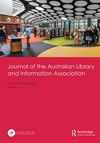Narrative expansions: interpreting decolonisation in academic libraries
IF 1
4区 管理学
Q3 INFORMATION SCIENCE & LIBRARY SCIENCE
Journal of the Australian Library and Information Association
Pub Date : 2022-10-02
DOI:10.1080/24750158.2022.2136963
引用次数: 1
Abstract
Narrative expansions is an important book for all Australian library workers. It comes at a time when Australian academic libraries and indeed the entire library and information sector in the country is focusing more and more on the important task of decolonisation, as exemplified by strategic directions set by the Council of Australian University Librarians (CAUL) with their Respecting Indigenous Knowledges program or similar efforts by the Australian Library and Information Association. The book addresses the topic of decolonisation in a very nuanced way, for instance when defining the term in the introduction chapter, questioning if anything can ever be truly decolonised when systems and organisations have been established by and within colonial structures. The editors Crilly and Everitt make the point that decolonisation should not be viewed as a project that can be ‘done’, but needs to be a shift in paradigm for it to be meaningful. They argue that it might be better to talk about diversifying and decentring knowledge and knowledge production, or about performing de-colonial acts, all depending on the context. The book also discusses related concepts such as antiracism, equality, diversity and inclusion. The editors acknowledge that defining and using terms for Non-White people is difficult because it ‘others’ large groups of people and lumps them together. This is reflected in the fact that different authors use different terms in the various chapters. In two different sections, the book highlights how attempts at decolonising have been made and are being made in academic library contexts, moving between theoretical explorations and examples of practical applications. There are chapters on student voice, research methodologies, staff diversity, information literacy, LIS education and decolonising classification schemes to give just a few examples. The book also includes reflections of authors on their experiences with libraries and academic libraries as Black, Asian and Minority Ethnic (BAME) students growing up in the UK. The authors of the book are mostly based or affiliated with academic institutions in the UK, with some voices from the United States, Canada and Kenya and references to events in South Africa. Australia is notably absent from that list, apart from one reference to a research project. This, however, does not make the book any less relevant to an Australian audience (and maybe volume two will focus on Australia!). Despite the sections addressing theoretical principles, the book is easy to read –mostly due to the fact that large parts are either case studies, or recollections and reflections of authors of their own lived experience with libraries. There are also a lot of references after each chapter to allow for deeper exploration of the topics. The book is available in print and as an ebook, so there is really no excuse to ignore its invitation to learn about how we can work on decolonising collections, services and spaces in our libraries.叙事扩展:解读学术图书馆的非殖民化
对所有澳大利亚图书馆工作者来说,叙事扩展是一本重要的书。此时,澳大利亚的学术图书馆,甚至整个国家的图书馆和信息部门都越来越关注非殖民化的重要任务,澳大利亚大学图书馆员理事会(CAUL)通过其尊重土著知识计划或澳大利亚图书馆和信息协会的类似努力制定的战略方向就是例证。这本书以一种非常微妙的方式讨论了非殖民化的主题,例如在引言章节中定义了这个术语,质疑当殖民结构建立了系统和组织并在其内部建立起来时,是否有任何东西能够真正地非殖民化。编辑Crilly和Everitt指出,去殖民化不应该被视为一个可以“完成”的项目,而需要在范式上进行转变,这样才有意义。他们认为,根据具体情况,最好是讨论知识和知识生产的多样化和分散化,或者进行去殖民行为。该书还讨论了反种族主义、平等、多样性、包容性等相关概念。编辑们承认,定义和使用非白人的术语是很困难的,因为它“其他”一大群人,并把他们混为一谈。这反映在不同的作者在不同的章节中使用不同的术语。在两个不同的章节中,本书强调了在学术图书馆背景下,如何在理论探索和实际应用实例之间进行非殖民化的尝试。书中有关于学生声音、研究方法、员工多样性、信息素养、LIS教育和非殖民化分类方案的章节,仅举几个例子。这本书还包括作者对他们作为在英国长大的黑人、亚洲和少数民族(BAME)学生在图书馆和学术图书馆的经历的反思。这本书的作者大多在英国或隶属于英国的学术机构,有一些来自美国、加拿大和肯尼亚的声音,并参考了南非的事件。值得注意的是,除了一个研究项目外,澳大利亚没有出现在这个名单上。然而,这并没有降低这本书与澳大利亚读者的相关性(也许第二卷将以澳大利亚为重点!)。尽管书中有些章节讲的是理论原则,但这本书还是很容易阅读的——主要是因为书中的大部分内容要么是案例研究,要么是作者对自己图书馆生活经历的回忆和反思。每章之后还有很多参考资料,以便对主题进行更深入的探索。这本书有印刷版和电子书,所以我们真的没有理由忽视它的邀请,去了解我们如何在图书馆的非殖民化馆藏、服务和空间方面开展工作。
本文章由计算机程序翻译,如有差异,请以英文原文为准。
求助全文
约1分钟内获得全文
求助全文
来源期刊

Journal of the Australian Library and Information Association
INFORMATION SCIENCE & LIBRARY SCIENCE-
CiteScore
3.40
自引率
15.40%
发文量
65
期刊介绍:
The Journal of the Australian Library and Information Association is the flagship journal of the Australian Library and Information Association (ALIA). It is a quarterly publication for information science researchers, information professionals, related disciplines and industries. The Journal aims to stimulate discussion and inform practice by showcasing original peer reviewed research articles and other scholarly papers about, or relevant to, the Australian and Southern Asia Pacific regions. Authors from the full range of information professions and areas of scholarship are invited to contribute their work to the Journal.
 求助内容:
求助内容: 应助结果提醒方式:
应助结果提醒方式:


